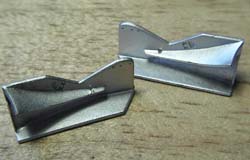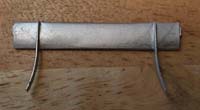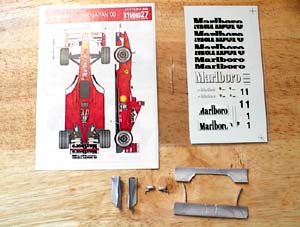Studio 27 Ferrari F1-2000 Japanese Transkit | | Introduction The Ferrari F1-2000 is the car that has returned Ferrari to the top of the sport after a long draught of over two decades. The last World Champion Ferrari was crowned in 1979 with Jody Sheckter leading the way. The F1-2000 Ferrari was locked in a close battle until the final race of the season in Japan with Team McLaren and Mika Hakkinen. A battle finally won by Michael Schumacher and Ferrari. Additionally the car was awarded both the Formula 1 2000 Constructors Championship and Drivers Championship with Michael Schumacher at the helm. For those of you less familiar with Formula 1, the cars and sponsorship logos change from track to track and from country to country. The cars are changed slightly, with front and rear wing variations depending on the type of track, whether it be a high speed track where little down force is required or a tight, twisty, low speed track where a lot of down force is needed. The sponsor logos change, as many of the cars carry cigarette advertising, and in this day and age, many countries completely ban this type of advertising. Therefore many of the sponsors get quite creative in circumventing these laws such as Team Jordan whose sponsor is Benson & Hedges. In countries where this type of advertising is banned, Team Jordan changes the words on the car to 'Buzzin Hornets'. Quite comical and actually I think it draws more attention to the sponsor than if left alone. Team Ferrari, whose sponsor is Marlboro simply run the white Marlboro triangle logo while leaving the Marlboro off of the car at tobacco advertising banned events. This transkit from Studio 27 allows the car to be built as it ran in the Japanese Grand Prix, where the driver's title was clinched. Japan allows full cigarette advertising and also has a slightly different front wing variation than that supplied in the brand new Tamiya Ferrari F1-2000 kit. The rear view mirrors are also slightly different. The Transkit This transkit from Studio 27 contains a white metal front wing in two pieces, two front wing end plates, a set of mirrors, an antenna, and a set of Marlboro decals. The kit also contains a set of instructions with English text and a color decal placement guide for the Marlboro sponsor logos. The base kit, Tamiya kit # 20048, portrays the car as it ran at the French Grand Prix. In the French Grand Prix the car did not carry the Marlboro logos and the front wing had a slightly angled front edge. For the Japanese Grand Prix the front wing had a straight front edge and underneath the wing were a set of airflow veins. The mirrors mounts were also slightly reconfigured for this race. These are small points for sure, but important to get accurate for the serious modeler or Ferrari fan. The Japanese Grand Prix was a significant race for the Ferrari F1-2000 because it is at this race the Championship was clinched. Tamiya mostly likely could not model the car as it appeared at this race because it did not want to issue cigarette advertising in its decals. This is the norm for model makers today who's demographic may include children or at least perceived to be aimed at children. I must say though the Tamiya kit is definitely complex and would be most difficult for a child. So Tamiya has left this to the aftermarket companies, and Studio 27 has filled the void nicely. Conclusion The cast white metal wings are some of the sharpest white metal I've seen cast in a long time. Zero flash and the wing looks to be a direct replacement for the kit part, no fiddling required. The decals look excellent with little carrier film. The decals also contain a few #1s, undoubtedly for use on a Ferrari F1-2001 - in Formula 1 the reigning world champ has the privilege of wearing the #1 the following season. The replacement mirrors are a nice touch that might have been overlooked. The English text on the instructions is a positive sign for future bilingual guidance. Overall I'd say this is an excellent transkit and another fine piece of work that has come to exemplify Studio 27. The only downside I can see with the trans kit may be its price. The transkit itself retails for 2800 Yen or around $27US, but the base Tamiya F1-2000 kit retails for 2400Yen, or around $23US. The transkit costs more than the base kit! The transkit can be had from the usual Japanese mail order shops such as Rainbow 10 or HobbylinkJapan. If you're looking for a more local outlet and live in the US you can try TnT hobbies on the east coast or Hapico on the west coast. Don't forget to take a look at Studio 27's web site, which is fascinating even if you can't read the Japanese text. (the English version should be up very soon). The site is full of pictures of upcoming and current releases from Studio 27. The site is kept very current with new releases. One of the more frustrating things to deal with in the past from Studio 27 has been the lack of multilingual instructions or guidance and the inability to make inquiries or get questions answered for those of us that can't read or speak Japanese. I think this is all about to change as Studio 27 has made a real effort to address this by appointing a Mr. Arnaud Taibi to be in charge of overseas (Europe, Australia, US, Canada, etc) marketing, sales and general dealings. So if you have a question or inquiry, don't hesitate to drop Mr. Taibi an email. My thanks to Arnaud Taibi and Studio27 for the review sample | 


 



  
    |














